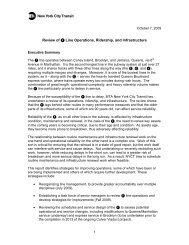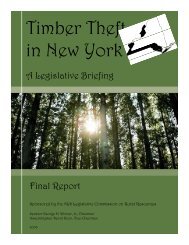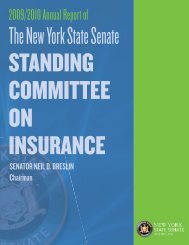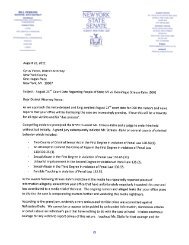Crime Committee Report e.indd - New York State Senate
Crime Committee Report e.indd - New York State Senate
Crime Committee Report e.indd - New York State Senate
You also want an ePaper? Increase the reach of your titles
YUMPU automatically turns print PDFs into web optimized ePapers that Google loves.
In Essex County’s detailed justification for the removal of people in prison, the County offered<br />
the following explanation:<br />
“Persons incarcerated in state and federal correctional<br />
institutions live in a separate environment, do<br />
not participate in the life of Essex County and do<br />
not affect the social and economic character of the<br />
towns.... The inclusion of these federal and state<br />
correctional facilities inmates unfairly dilutes the votes<br />
or voting weight of persons residing in other towns<br />
within Essex County...”<br />
These 13 counties in <strong>New</strong> <strong>York</strong> <strong>State</strong> have joined municipalities across the country, by taking<br />
matters into their own hands to address, on the local level, the redistricting inequities that result<br />
from relying on the Census Bureau’s counting of people in prison. This removal of people<br />
in prison on the local level does not, of course, put incarcerated people back in their census<br />
blocks prior to incarceration. However, from the perspective of these rural counties, counting<br />
people at home and not counting them at all is the same thing. Either way, the data they<br />
use for county districts does not contain the prison populations. About 100 local governments<br />
exclude, for redistricting purposes, the Census Bureau’s prison counts. A few states (Colorado,<br />
Mississippi, <strong>New</strong> Jersey and Virginia) require or encourage local governments to do so, but the<br />
majority of these counties do so on their own.<br />
As awareness in the issue of prison-based gerrymandering has grown, so too has interest in<br />
state-level solutions. Currently, legislation is pending in Florida, Illinois and Maryland that<br />
would determine the home addresses of incarcerated people and count them at their addresses<br />
prior to incarceration. (Senator Shields in Oregon is also expected to re-introduce legislation<br />
in the special session during the week of February 1, 2010.) In Wisconsin, a constitutional<br />
amendment has been introduced that would prohibit the state and local governments from<br />
including prison populations in the redistricting data.<br />
In addition to the above states, in the past, bills to count people in prison at their address<br />
prior to incarceration for state redistricting purposes have been introduced in Texas and Michigan.<br />
<strong>State</strong>s and localities are addressing this issue because of the distorting effect that people in<br />
prison have on the drawing of legislative boundaries and because the population is distinguishable<br />
from other populations, such as students and those serving in the military, that are counted<br />
by the Census Bureau in what are referred to as “Group Quarters” for a number of reasons.<br />
Most importantly, people who have been convicted of a felony and are incarcerated or on parole<br />
cannot vote in <strong>New</strong> <strong>York</strong> <strong>State</strong>, either in the district where the prison is located or using an<br />
absentee ballot at their address prior to incarceration. In contrast, college students and military<br />
personal can participate in elections and register to vote from either their local residence or<br />
by submitting an absentee ballot. In addition, people in prison do not interact with or benefit<br />
from the district where the prison is based. People in prison do not use the schools, hospitals,<br />
or other public facilities in the community where the prison is based The costs of the prisons<br />
are not borne by the community ‘Where the prison is located, but rather by all <strong>New</strong> <strong>York</strong> <strong>State</strong><br />
taxpayers. Costs that are not covered by the <strong>State</strong>, such as phone expenses and commissary<br />
bills, are paid for by the families of people in prison.<br />
52<br />
<strong>New</strong> <strong>York</strong> <strong>State</strong> <strong>Senate</strong>









![[PDF] Proposed MTA Capital Program - New York State Senate](https://img.yumpu.com/24854139/1/190x245/pdf-proposed-mta-capital-program-new-york-state-senate.jpg?quality=85)






